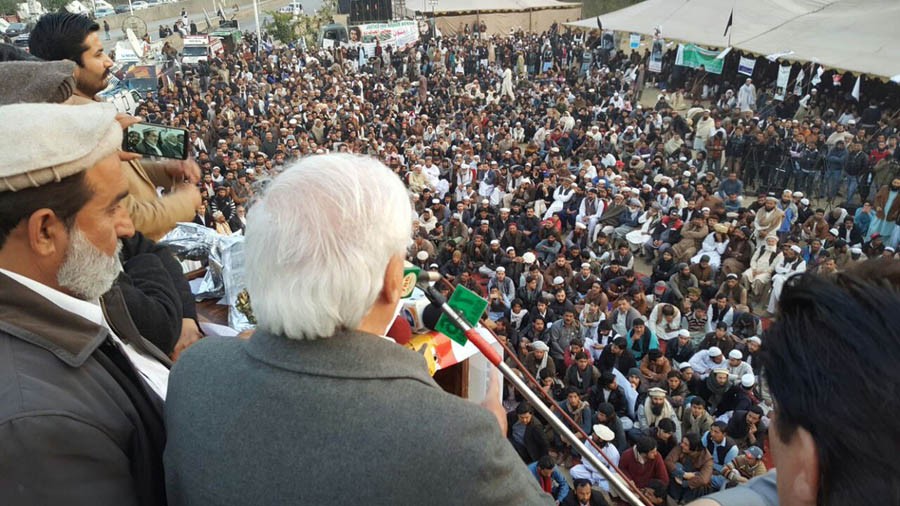
All Pakhtun Qaumi Jirga by tribesmen stays put in the capital as their demands are yet to be met

The sit-in dubbed ‘All Pakhtun Qaumi Jirga’, drawing crowd from the Federally Administered Tribal Areas (FATA), Khyber Pakhtunkhwa, Islamabad, Lahore, Karachi and Quetta, continues in front of Islamabad Press Club since February 1. The following story is the outcome of my observations and interviews with the participants especially from Mehsud tribesmen from FATA during the course of my four visits to the jirga on four different days.
The jirga has four demands. The first demand is the immediate arrest of Rao Anwar and his subsequent trial in a court of law not only in the case of extra-judicial killing of Naqeebullah Mehsud in a "fake encounter" -- as determined by a three-member investigating team -- but other citizens from FATA as well. "Rao Anwar has killed 444 people in 192 fake encounters", said Manzoor Pashteen, the organiser and the undisputed leader of the jirga.
A Mehsud from South Waziristan, Pashteen was quoting these figures from a report by the National Commission for Human Rights, a fact-finding body working under the directions of National Assembly Speaker Sadiq Ayaz. Pashteen said that the circle of investigation into extra-judicial killings should be expanded and all responsible, including Rao Anwar, must be brought to the book.
The second demand of the jirga is the clearing of mines mainly from the Mehsud populated areas of South Waziristan. One of the organisers of the sit-in, himself a Mehsud from South Waziristan, said that 18 Mehsud men, women and children have been killed in the landmine explosions in the tribal agency. Similarly, 60 others have lost their limbs in the landmines blasts, he continued. He added that landmines, swarming the Mehsud territory, were emplaced during military operations against Taliban and left unattended to after Taliban were reportedly flushed out of the area.
"Casualties from the landmine blasts are a North Waziristan problem too. Today (Feb 8), I received the news of a girl injured in a mine blast there," stated Pashteen. "The political administration has helped the victims with a compensation that ranged from five to ten thousand rupees," derided another young man from Mehsud tribe. "Our grazing fields, contaminated by mines, have been killing our cattle too," he added. "We demand the Chief of Army Staff to clear our areas from mines that kill and maim us on daily basis."
The third demand is putting an end to curfews mainly in South Waziristan. A young Mehsud narrated how a curfew remained imposed for a couple of days in Shamkai village in the sub-division of Sarwakai after a mine blast killed a soldier who was fetching water from a bourn. "Our whole village had to migrate to Dera Ismail Khan after the incident," the Mehsud added.
An activist with alias Junaid from Spinkai South Waziristan shared the story of his village. "A car blast killed five Mehsud tribesmen. A curfew was imposed to pressurise tribesmen to identify and surrender the culprit. During the curfew, the rolls would be called of all males of age 10 years and above including the elderly as old as 80 years. Worse, the patients were not allowed to see a doctor."
Read also: Mehsuds struggle to find a voice
The fourth demand of the jirga is the recovery and fair trial of all missing people from FATA, Khyber Pakhtunkhwa and the rest of Pakistan, said Pashteen. A young Mehsud told me that there were hundreds of missing people from tribal areas and Khyber Pakhtunkhwa.
The state has responded to these demands. After a delegation of Mehsud journalists called on him on February 4 to meet the jirga’s demand, the Director General Inter-Services Public Relations had informed them, as reported, that demining of the Mehsud territory had started in earnest. When I asked a Mehsud demonstrator if he was convinced of the claim about demining, he said, "demining is such a rigorous and time consuming task that once a security official confided in him that if clearing of mines is taken seriously even then it would take no less than five years to demine the Mehsud territory." Previously too, as he said, "demining efforts were undertaken only to be abandoned unfinished." By February 8, Pashteen had no news of any demining work being carried out in South Waziristan.
Similarly, on February 6, a delegation of 15 Mehsud representatives from the jirga called upon Prime Minister Shahid Khaqan Abbasi who assured them to meet all their four demands. Whereas the traditional leadership of maliks, convinced by the PM assurances, deserted the sit-in on February 6, Pashteen, one of the members of the delegation, vowed to continue the jirga without them. "I asked that the PM should sign an agreement with us or at least he should give us assurances in writing that he will honour his word."
What would be his future course of action, I asked. "We shall continue our peaceful dharna until our demands are met", Pashteen remarked. "Two influences make me a nonviolent soldier", the young Mehsud continued. "These are weariness from orgy of violence I have been undergoing for more than a decade back in South Waziristan, and Bacha Khan’s philosophy of nonviolence."